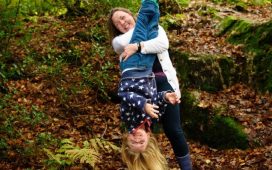I remember them being born, Emily, Hamish, William, Shelbie, Zoe and Nathan. And now they’re all grown up. How did that happen? It’s a question that takes on additional meaning in this context. Emily et al are the subjects of the documentary series Born to Be Different (Channel 4), which has been following the children since 2003 as they grow up with different disabilities: some profound, some less so, some multiple, some hidden, some visible. The instalments arrive every few years: this is the 10th series, and sees them all turn 18.
For some, this is a milestone they were never expected to reach. It may also be the last one. Two of the documentary “family” are now in palliative care. Shelbie, always the most severely disabled of the children, and her extraordinary, indomitable mother, Vicky, and stepfather, Nick, are reaching the end of their time together. And still, as her daughter’s health crises concertina ever closer together, Vicky’s spirit does not quail. Shelbie’s stats drop dangerously low every night, and Vicky and Nick bring her back from the brink of death knowing that soon they will not, cannot succeed. In the meantime, they plan a funeral that Shelbie would enjoy.
William, who has many physical and mental disabilities, has joyfully moved into a residential home to live in a flat with carers and without his parents. They have not told him that he has an inoperable tumour on his kidney that puts him at risk of a catastrophic, fatal bleed at any moment. “We would rather he had a short, happy life than a longer one having horrific things done to him,” says his stricken, dry-eyed mother firmly. He is, she says, blissfully unaware of the situation “and long may that continue”.
For the rest of the group (though Nathan dropped out of filming after series eight and is, hopefully, doing well off camera), life is opening out. Zoe heads off to university to start a law degree. She was offered the services of a carer, but declined in favour of as much independence as possible. She is worried about cooking for herself. Her mother worries that “although you try not to let the disability rule, obviously she has these weaknesses. If someone tries to hurt her, she can’t defend herself.” One of Born to Be Different’s greatest talents is to find the single utterance that suddenly illuminates chasms. In a few words, the depth and scale of a child’s blessed ignorance of the world is suddenly starkly lit.

Emily is studying for a nursing degree but is staying at home to do it. Her life – soon to include her professional work as she passes her first exam with ease – is shaped by the extensive demands of her stoma, without which she would be doubly incontinent because of her spina bifida. Her mother notes the circumscription with regret, but Emily – by nature or nurture – is sanguine. The little girl who was content with no longer having to wear pull-up nappies when the operation granted her that freedom at the age of nine (“I’m same as me friends today! ’Cos I’m in knickers!”) persists.
Hamish, who has achondroplasia (a genetic condition that results in dwarfism), is now studying for a degree in engineering in Christchurch, New Zealand, and is a Paralympian swimmer training for Tokyo 2020 (before this year’s games were postponed because of the coronavirus crisis). He is the only one in this opening episode with whom the subject of romantic relationships is broached. For the most part he has the quiet confidence of the genuinely talented, but on this topic is a little unsure. “Guess it’ll be a bit difficult,” he says, squirming only slightly, “because I’m short. But I’ve got a bit of chat, I think.”
His female flatmates think he’s handsome. “And,” one of them points out before they all collapse laughing, “He’s going to be an engineer – gonna have money as well. Be quite a catch!”
The new series maintains its tenderness and continues to walk unerringly on the side of intimacy rather than of intrusion or exploitation. A large amount of trust has clearly grown between the makers and the families over the past two decades. It is to the viewers’ benefit, and one can only hope to the subjects’ too. It’s been a detailed anatomisation of the challenges presented by different kinds of disability, by social and cultural attitudes towards difference – and by governmental neglect. This was particularly true in earlier series as the children left infancy and parents began the criminally hard fight to get vital support and educational provision for them.
Above all, the series has been a testimony to the power of love and dedication – from parents for their children, of course, but also of that of doctors for patients and of scientists finding ways to alleviate suffering. Something to hold on to, always.













